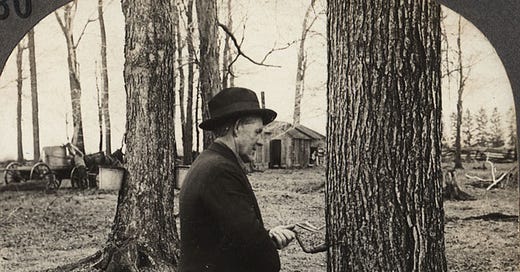I love Donald Hall’s poem “Maple Syrup” for a number of reasons. Too many to name really. But, for starters, I love what this poem says not only about memory, but specifically about memories of specific people and the contributions they made in the world while living. This theme has occupyied my mind a bit after a recent conversation with my sister, who is wise.
Also, the other night I finished a book of interviews with Ursula LeGuin (another very wise person), and I find her to be, like me, interested in “durable technologies.” In fact, technologies so durable they transform into a type of dead metaphor—the book, the pencil, the implements used to extract, make, and contain the maple syrup in this poem. We should, as people, do better at recognizing and giving respect to our durable creations.
I’ve heard people talk about this poem’s last lines of being cold and negative, but I’ve never responded that way. For me, they express the need for active memory and attribution—the breathing respect we should show people: past, present, and future—that only our minds can provide. I read this poem as such an act.
Maple Syrup
by Donald Hall
August, goldenrod blowing. We walk
into the graveyard, to find
my grandfather’s grave. Ten years ago
I came here last, bringing
marigolds from the round garden
outside the kitchen.
I didn’t know you then.
We walk
among carved names that go with photographs
on top of the piano at the farm:
Keneston, Wells, Fowler, Batchelder, Buck.
We pause at the new grave
of Grace Fenton, my grandfather’s
sister. Last summer
we called on her at the nursing home,
eighty-seven, and nodding
in a blue housedress. We cannot find
my grandfather’s grave.
Back at the house
where no one lives, we potter
and explore the back chamber
where everything comes to rest: spinning wheels,
pretty boxes, quilts,
bottles, books, albums of postcards.
Then with a flashlight we descend
firm steps to the root cellar—black,
cobwebby, huge,
with dirt floors and fieldstone walls,
and above the walls, holding the hewn
sills of the house, enormous
granite foundation stones.
Past the empty bins
for squash, apples, carrots, and potatoes,
we discover the shelves for canning, a few
pale pints
of tomato left, and—what
is this?—syrup, maple syrup
in a quart jar, syrup
my grandfather made twenty-five
years ago
for the last time.
I remember
coming to the farm in March
in sugaring time, as a small boy.
He carried the pails of sap, sixteen-quart
buckets, dangling from each end
of a wooden yoke
that lay across his shoulders, and emptied them
into a vat in the saphouse
where fire burned day and night
for a week.
Now the saphouse
tilts, nearly to the ground,
like someone exhausted
to the point of death, and next winter
when snow piles three feet thick
on the roofs of the cold farm,
the saphouse will shudder and slide
with the snow to the ground.
Today
we take my grandfather’s last
quart of syrup
upstairs, holding it gingerly,
and we wash off twenty-five years
of dirt, and we pull
and pry the lid up, cutting the stiff,
dried rubber gasket, and dip our fingers
in, you and I both, and taste
the sweetness, you for the first time,
the sweetness preserved, of a dead man
in the kitchen he left
when his body slid
like anyone’s into the ground.




That was a beautiful poem, new to me. The ending was satisfying and positive: an unexpected gift to the living from someone long dead. Not a bad aspiration....